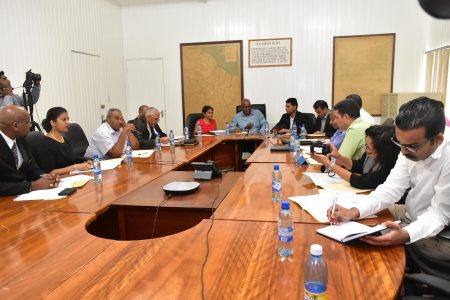A joint public/private sector initiative to realize the setting up of a multi-purpose agro-processing plant in Guyana will be high on the agenda of the second Inter Ministerial Roundtable discourses between government and the Guyana Manufacturing and Services Association (GMSA), Stabroek Business has been informed.
Articulating the planned outlining of the proposal to the government’s representatives at the roundtable, including Finance Minister Winston Jordan, Natural Resources Minister Raphael Trotman, Public Infrastructure Minister David Patterson and Minister of Business Dominic Gaskin, GMSA Vice President Ramsey Ali told this newspaper that the GMSA will be seeking a government buy-in for the creation of a plant being set up “within two to three years.” Ali told Stabroek Business that the GMSA was thinking of “the setting up of a multi-functional entity that can be expanded modularly. There really is no reason why this country should not have a working agro-processing facility to enable us to start selling packaged agricultural produce in the markets.” He said that other countries in the hemisphere have been using similar facilities and have been able to put their manufactured goods on the United States market.

President of the GMSA Shyam Nokta said that the envisaged public/private sector facility should be one that allows producers to bring their raw material to the factory and leave with finished products.
The disclosure by the GMSA officials was made against the backdrop of a distinct note of optimism about the environment in which the Roundtable exchange was unfolding. In what he suggested was a distinct departure from the previous approach to public/private sector talks Nokta told Stabroek Business that the nature of the current engagement was now “a little different.” He said that setting aside the formal discourse at the round-table level there had been, as well, technical engagements over the past few weeks. “Technical teams have been going through a comprehensive list of issues that came up at the round table,” he said, alluding to a recent three-hour meeting between the two sides that “looked at issues in a comprehensive way, trying to determine what is the way forward and agreeing on a plan of action. Our approach is not only to be critical, but to bring solutions, bring suggestions, bring ideas and to work with these in a comprehensive way and then to move to implementation. If we don’t do that we will get stuck at identifying same issues, raising them, talking about them. Eventually we will start pointing fingers at each other rather than sitting down and agreeing on how we move forward. We will differ in some areas but I want to remain optimistic. The GMSA also feels the need to show initiative.”
Ali told Stabroek Business that the GMSA was encouraged by its engagement with Finance Minister Jordan and Business Minister Gaskin at the recent Roundtable forum. “I do not get the impression that those two Ministers are there for a talk shop. I think they are well-meaning and given the recent interaction on agro processing and forest products I am sure that something positive is going to come of this.” Ali’s views on the prevailing climate at the ongoing roundtable has been echoed by Nokta.
Local agro processors have continually bemoaned the weakness of the country’s manufacturing infrastructure as being largely responsible for what is widely felt to be the underperformance of the sector up to this time. Both Nokta and Ali said that part of the focus of the GMSA during the roundtable sessions on agro-processing would be to forge an enhanced public/private sector partnership in order to improve the fortunes of the sector.
Head of the GMSA’s Trade and Investment Committee Clem Duncan told Stabroek Business that he believed that that the fortunes of the local manufacturing sector would be significantly enhanced if the government’s policy of allocating 20 per cent of its contracts to small businesses could be executed, as enshrined in the 2004 Small Business Act. ”If we can have that formally implemented then we can be able to set up an organizational structure that allows for the importation of items in bulk and for the distribution of those items to local manufacturers.
Little has been heard of the implementation of this provision since late last year when the Business Minister announced at a Small Business Bureau forum that the provision was scheduled to come on stream during the second quarter of this year.




